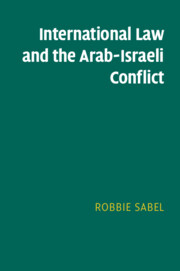Book contents
- International Law and the Arab-Israeli Conflict
- International Law and the Arab-Israeli Conflict
- Copyright page
- Contents
- Abbreviations
- Introduction
- 1 Is International Law Relevant?
- 2 The World War I
- 3 The Zionist Movement and the 1917 Balfour Declaration
- 4 Post–World War I and the 1922 League of Nations Mandate for Palestine, 1920–1947
- 5 The 1947 Partition Plan
- 6 Israel’s Declaration of Independence
- 7 The 1948 Arab-Israeli War
- 8 1949 Armistice Agreements
- 9 The Arab Refugee Problem
- 10 The 1967 Six Day War
- 11 UN Security Council Resolution 242
- 12 Camp David 1978
- 13 1979 Egypt–Israel Peace Treaty
- 14 Taba Arbitration
- 15 The Legality of Israeli Exploitation of Oil from Sinai
- 16 The Oslo Accords
- 17 Israel–Jordan
- 18 Post Oslo Developments
- 19 The Status of the ‘West Bank’ (Judea and Samaria) and the Gaza Strip
- 20 Israeli Settlements in the West Bank
- 21 Controversial Elements of Military Administration
- 22 Freedom of Navigation through International Waterways in the Region
- 23 Israel–Syria
- 24 Jerusalem
- 25 Controversial Laws of War Issues
- 26 Is Palestine a State?
- 27 Water Resources
- 28 Implications for Future Negotiations
- Index
11 - UN Security Council Resolution 242
Published online by Cambridge University Press: 21 April 2022
- International Law and the Arab-Israeli Conflict
- International Law and the Arab-Israeli Conflict
- Copyright page
- Contents
- Abbreviations
- Introduction
- 1 Is International Law Relevant?
- 2 The World War I
- 3 The Zionist Movement and the 1917 Balfour Declaration
- 4 Post–World War I and the 1922 League of Nations Mandate for Palestine, 1920–1947
- 5 The 1947 Partition Plan
- 6 Israel’s Declaration of Independence
- 7 The 1948 Arab-Israeli War
- 8 1949 Armistice Agreements
- 9 The Arab Refugee Problem
- 10 The 1967 Six Day War
- 11 UN Security Council Resolution 242
- 12 Camp David 1978
- 13 1979 Egypt–Israel Peace Treaty
- 14 Taba Arbitration
- 15 The Legality of Israeli Exploitation of Oil from Sinai
- 16 The Oslo Accords
- 17 Israel–Jordan
- 18 Post Oslo Developments
- 19 The Status of the ‘West Bank’ (Judea and Samaria) and the Gaza Strip
- 20 Israeli Settlements in the West Bank
- 21 Controversial Elements of Military Administration
- 22 Freedom of Navigation through International Waterways in the Region
- 23 Israel–Syria
- 24 Jerusalem
- 25 Controversial Laws of War Issues
- 26 Is Palestine a State?
- 27 Water Resources
- 28 Implications for Future Negotiations
- Index
Summary
UN Security Council Resolution 242, adopted after the June 1967 Six Day War, was a non-binding recommendation for settling the Arab-Israel conflict. Israel and the Arab States agreed to accept the recommendations. Syria and the PLO at first refused to accept it but later, they also agreed to accept it, and thus it became the accepted framework for ending the Arab Israel conflict. The preamble of the Resolution states that acquisition of territory by war is inadmissible and that the conflict must be settled by peaceful means. The operative parts of the Resolution call for Israel to withdraw from territories occupied in the Six Day War, for the Arab States to end the state of war with Israel, for freedom of navigation in international waterways and for a just settlement of the refugee problem. The phrasing used in the clause about Israel withdrawal is “from territories.” There is a continuous disagreement as to whether this implies withdrawal from all the territories occupied or that the issue of borders is subject to negotiation between the parties. By accepting the Resolution, the Arab States apparently abandoned any legal basis for demanding Israel withdrawal from beyond territories occupied in the Six Day War.
Keywords
- Type
- Chapter
- Information
- International Law and the Arab-Israeli Conflict , pp. 196 - 208Publisher: Cambridge University PressPrint publication year: 2022

